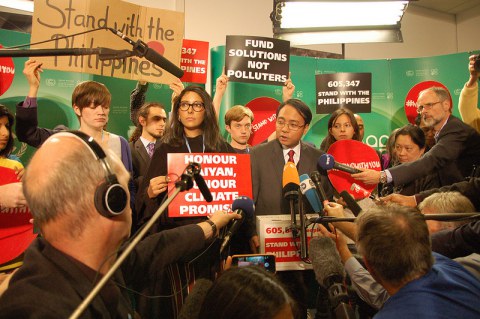By Jeppe Fischer, Photo by 350.org
The Philippines has been devastated by Typhoon Haiyan with at least four million people displaced. Haiyan has also had impact beyond the Philippines though, and in a different way, at the UN climate change summit in Warsaw, Poland. Media coverage of the negotiations has been overshadowed by the typhoon, and The Verb explores the impact.
Media coverage has been dominated by the typhoon ever since Yeb Saño’s impassioned plea in the opening plenary. A key area of focus for the Philippines, but also the negotiations, is loss and damage — the very idea that there should be compensation for climate impacts.
Saño has become somewhat of a celebrity within the conference hallways with over a hundred other delegates fasting in solidarity with him. As the lead negotiator on loss and damage though, is he doing his country and negotiating bloc a disservice though with this voluntary fast? Despite highlighting the importance of climate finance, media coverage has been more focused on the human face of the story.
Negotiations on loss and damage, or even other finance related issues, are going far from well with many “goalposts” on climate action simply being postponed. As we approach the final plenary session in this vacuum of inertia, there is still hope that Warsaw may at least provide a roadmap for an international climate finance mechanism.
Saño is unimpressed with the progress, urging for more: “it is the 19th COP, but we might as well stop counting, because my country refuses to accept that a COP30 or a COP40 will be needed to solve climate change.”
G77 lead negotiator Juan Hoffmaister agreed saying that “if loss and damage isn’t addressed in Warsaw then it sends a signal to the world that some countries do not take climate change seriously.” Relying on ad-hoc humanitarian aid is unreasonable given the likelihood that climate-related calamities are going to become the new normal.
Last year in Doha, Qatar at the last round of negotiations, the Philippines was hit by Typhoon Bopha, and media coverage of the event in relation to the negotiations has been quite similar.
Does the international media just like to dwell on geopolitical tragedies, or is it easier to put human emotions at the forefront and sideline the political inaction? The question that we’re interested in is: does this come at the expense of the climate talks? The UNFCCC is a complicated process with a multitude of nuances and system that works off of assumed knowledge – it’s not an easy beat for non-environment journalists.
The work of the UNFCCC is complemented by domestic work, which often requires comprehensive and in-depth political coverage. Across the board, we are yet to see that in Warsaw with most of the focus being on Saño.
There has been some mumbling from conference cynics on whether Saño was sincere or simply playing a game of politics and the fast was merely a tactic. The general public and media largely seem to agree, and believe, that Saño has been incredibly sincere in his gestures though. The idealist within doubts that a diplomat, of all people, would openly cry two years in a row.
Regardless, the Philippines have become a rising power within the UNFCCC context through leveraging personal narrative politically. Not everyone agrees though, with American negotiator Trigg Talley saying that the focus on loss and damage is “counterproductive from the standpoint of public support” for the UN climate talks.
The COP19 is set to end within the next 48 hours, and we’ll be watching closely to see what the Philippines does next.
By Jeppe Fischer, Photo by 350.org (CC BY-NC-SA 2.0)
The original of this story is from The Verb. Reproduced with permission. The Verb is a newswire service focusing on the stories that matter. They are currently reporting from COP19. Follow them on Facebook and Twitter.

